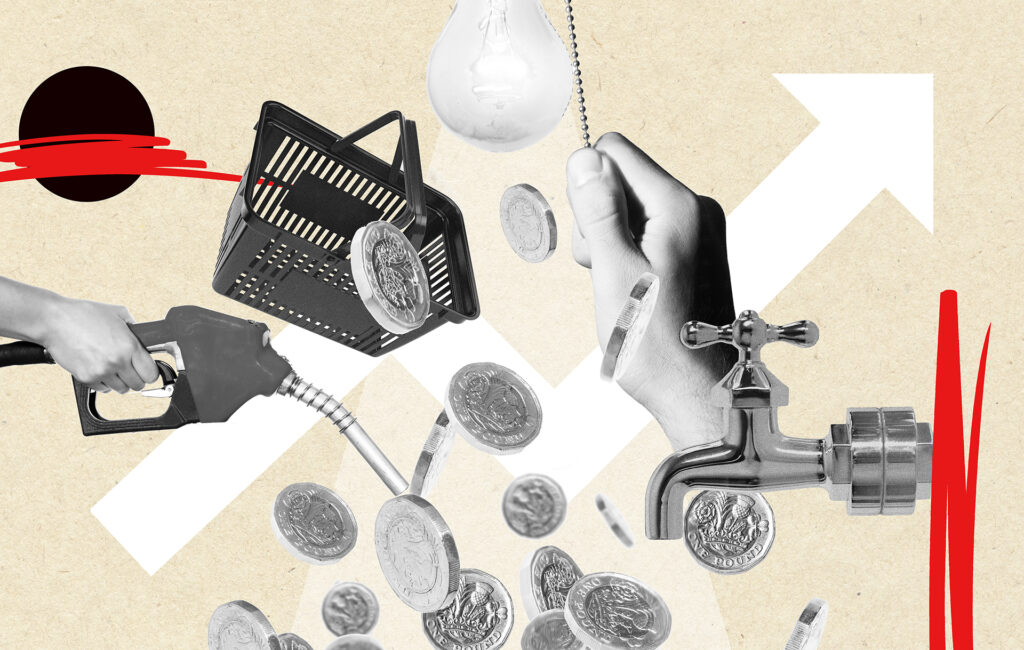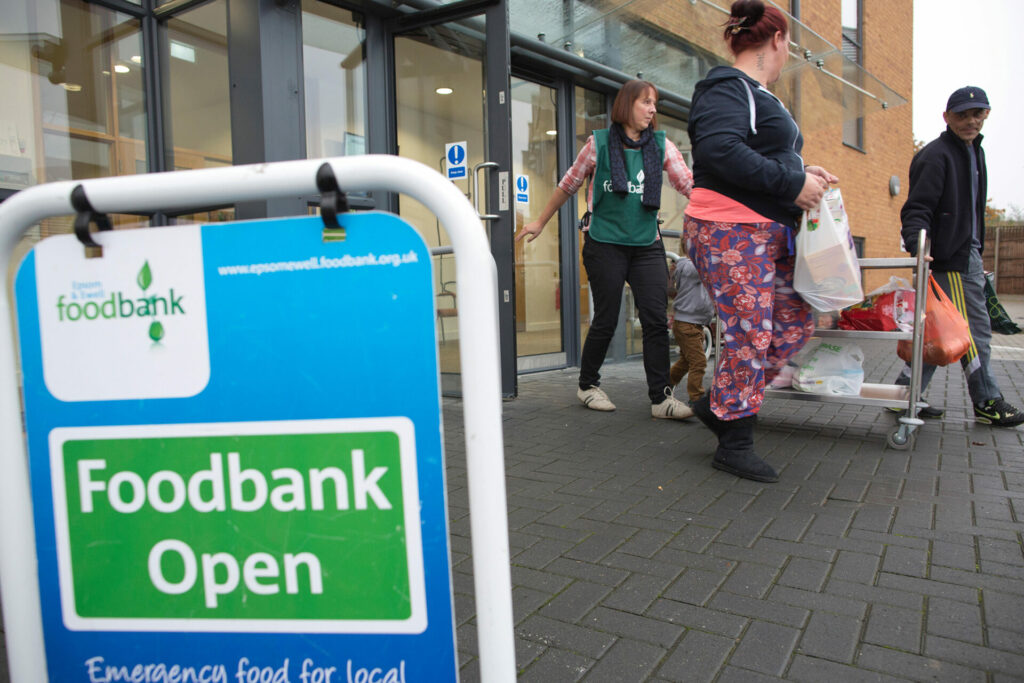The true price of the cost of living crisis
In the UK, we are experiencing the worst decline in living standards since the Industrial Revolution as the price of the basics – energy and food – soars, forcing more than a million people into poverty. But there is an alternative...
By Simon Childs

For Tom Sefton, the poverty lead at Epsom and Ewell food bank, one of the most upsetting things about his role is seeing people who clearly didn’t expect to be relying on handouts turn up to ask for help for the first time. “We’ve got people who come to us and say, ‘I’ve been donating to the food bank for years. I never expected to be at the receiving end of it.’”
Epsom and Ewell, in the commuter belt of leafy Surrey, is not the first place that springs to mind when we think about poverty. But even here, food-bank usage has surged. For the first three months of 2022, 74 per cent more people were fed by the five food banks that Sefton oversees, compared to the same period in 2019 before the pandemic hit.
Most of the people Sefton works with have had a personal crisis that they didn’t have enough money to fix, but he’s noticed a change recently. “The energy bills are coming up again and again,” he says.
In April this year, UK households faced a record 54 per cent increase in their gas and electricity bills, after regulator Ofgem lifted the maximum rate suppliers can charge to £1,971, reflecting a fourfold increase in the market price of energy.
A mother of a family of four surviving on Universal Credit told Sefton that before Christmas their combined gas and electricity bill was £90 a month. Then it went up to £147 a month. Finally, she received a letter informing her that it would rise to £189 a month.
“Where can she get that [extra] £90 a month? Where’s it going to come from? People are going to go into debt. The food bank can help people but it’s not going to fill the gap,” explains Sefton.
Another of Sefton’s clients worked out that cooking a meal on her electric hob cost 83p. “And then she worked out how much it costs to cook a meal using a slow cooker; they were, like, 20p. She stopped using her electric hob at all, and she was now cooking all her meals in her slow cooker.”
“Despite its affluent location, Epsom and Ewell food bank has seen a surge in the number of people living off food donations because they cannot afford to eat”
This is the cost of living crisis — rising fuel costs, rising food costs, rising everything costs — which has been dragging more people into the mire of poverty since late 2021.
According to James Meadway, economist and director of the Progressive Economy Forum, there are three main causes for this. The first is Covid: “You’ve got lockdowns everywhere, most people stopped working, factories shutter,” meaning that manufacturing “takes this really big hit”. With lockdowns memory-holed, people have hit the shops and discovered that the people who make the things they want to buy were locked down, too.
Secondly, there’s extreme weather thanks to climate change. “You’ve got frost in Brazil which damages coffee-bean growing, floods in Canada which damage wheat growing, droughts in Taiwan which hit semiconductor manufacture.” This introduces more disruption into the supply chain.
Thirdly, Vladimir Putin invaded Ukraine — a major exporter of wheat and corn — impacting supply of these basic foodstuffs and causing their prices to rise, too. The West then decided to sanction Russia, creating another economic shock.
“Sitting on top of this is a whole load of mostly big corporations, particularly oil and gas companies, who are quite happy just to say, ‘OK, the world price has gone up. We’re just going to pass this straight on to the people buying our petrol, our natural gas,’” says Meadway.
When these systemic shocks trickle down to ordinary people who were already struggling to make ends meet, it’s brutal. Of those Sefton speaks to, “Virtually everybody is now skipping meals or going whole days without meals at the moment, because they just cannot afford to eat properly, or to eat at all.”

What the media refers to as the cost of living crisis refers to the particular hardships that have taken hold since late 2021. But many people in Britain have been enduring a cost of living crisis for years.
In 2018, a decade after the financial crash, Philip Alston, UN Special Rapporteur on poverty, did a tour of the UK and compiled a report. The levels of child poverty at the time were “not just a disgrace, but a social calamity and an economic disaster, all rolled into one,” he said. He wrote that the UK’s benefits system was “driven by the desire to get across a simple set of messages: the state does not have your back any longer, you are on your own.”
As a result, there is no slack left in the benefits system. Many were already one personal crisis away from needing to use a food bank. When you’re living on the edge, if you lose your job, your relationship ends or if your car breaks down so you can no longer commute to work, it can spell disaster. This meant that when the triple whammy of Covid, climate change and war brought increased prices, even more people were thrown overboard, while those who were already gasping for breath found themselves in even deeper water.
If that imagery seems bleak, others are dispensing with metaphors altogether. Food writer and anti-poverty campaigner Jack Monroe told MPs in March, “The impact of the cost of living crisis on those households is going to be in some cases fatal, and that’s not a term I use lightly.”
In the 90s, Sefton worked as an academic researcher into poverty, before moving into policy. Now he works at the coal face, dealing directly with people who are struggling on a day-to-day basis. “The situation now is the worst I have seen in those 30 years,” he reflects.
Martin Lewis, founder of MoneySavingExpert.com, has been advising people how to save cash on everything from switching energy providers to credit cards since 2000, but even he is out of ideas. “I’ve been through the financial crash. I’ve been through Covid… This is the worst,” he told BBC’s Sunday Morning, in a dramatic intervention before the government’s March Spring Statement.
“As the Money Saving Expert, I am virtually out of tools to help people now,” he said, with a note of exasperation in his voice. “It’s not something money management can fix. It’s not something with those on the lowest incomes, [that] telling them to [tighten] their belts will work. We need political intervention.”
“It looks like the worst decline in living standards since the Industrial Revolution”
Those looking for just that have been disappointed. When the Spring Statement came, Sunak failed to increase benefits in line with inflation. In real terms, this amounts to a cut. Analysis from the Joseph Rowntree Foundation predicts that this will mean families in poverty are £446 per year worse off in 2022-23 compared to if benefits had been uprated in line with current inflation levels. It means 600,000 people will be pulled into poverty as a result of this “inaction”, the foundation predicts.
Dave Innes, head of economics at the Joseph Rowntree Foundation, said: “Security is only real if it’s for everyone. The choices the Chancellor has made today won’t deliver any security for those at the sharpest end of this crisis; instead, he has abandoned many to the threat of destitution.”
Sunak — believed to be the richest man in the House of Commons — is ideologically Thatcherite. He is instinctively against the idea that the state should solve people’s problems. Nevertheless, his inaction belies the scale of the crisis. When I ask Meadway to put things into perspective, he struggles to find a precedent that would resonate with anyone currently alive. “It looks like the worst decline in living standards since the Industrial Revolution,” he says.
Away from the food banks and the acute poverty will be a gentler form of misery. People with ordinary jobs will have to cut down on “all the nice things you’d like to do”, and instead spend your money on “your rent, your food, on heating your house”, says Meadway. “So, it’s just a really unpleasant, nasty squeeze you’ve got for most people this year. I don’t think there’s anybody alive in Britain who’s ever experienced anything that looks quite like this.”
Although it’s not something we’ve experienced before, these economic shockwaves are likely to become a feature of our lives as climate change worsens. With that in mind, you would be forgiven for having a pretty bleak vision of the future. But does it have to be this way?
“The impact of the crisis is going to be in some cases fatal”
There’s no slack in the system for the poor, but there’s plenty elsewhere. “Company profits in Britain are at record highs right now. Some of the most profitable companies in the whole country are gas suppliers and electricity suppliers,” says Meadway. “There are these big environmental shocks happening, but companies are still making huge profits. So instead of them making huge profits, why not squeeze their profits and keep prices the same? This is a political decision.”
This is what has happened in France. In order to protect customers from price rises, the government has forced the state-run energy supplier EDF to take an €8.4 billion (£7 billion) hit.
As far as Sefton is concerned, there needs to be much more targeted welfare support for those on low incomes. For him, it’s pretty simple. “Most of the people I meet are trying to do the right thing in really difficult circumstances. They’re trying to give their children all the opportunities that other children have but they just aren’t able to do it.
“I think we need to have a more caring, compassionate, fair response to support people who are going through difficult times,” he continues. “That kind of happened during Covid. I hope that we can sustain some of that and have a lasting impact on how we look after people.”
Taken from the June/July 2022 of Rolling Stone UK. Buy it here.
